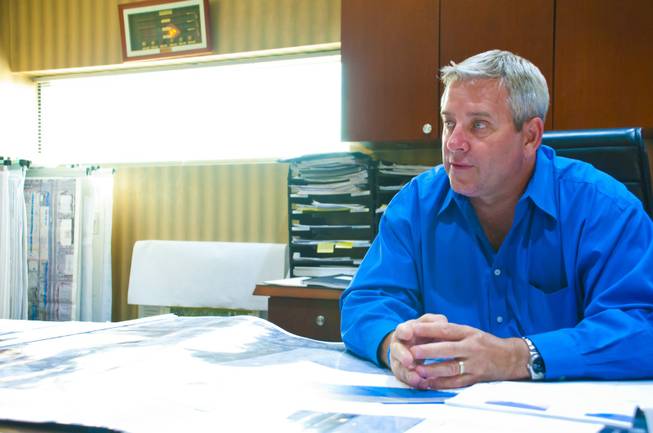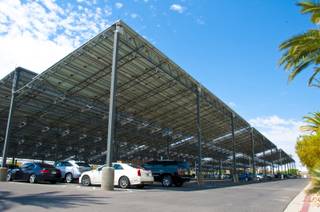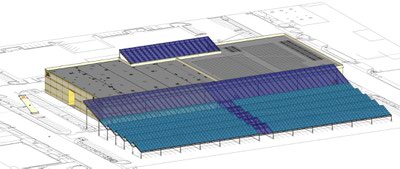
Matthew Ryba, CEO for TWC construction, a partner company of ProCaps Laboratories, explains the next steps the company will take to convert their building to a net-zero facility. Monday July 25th, 2011.
Tuesday, July 26, 2011 | 2 a.m.
Sun coverage
Sun archives
- Deadlines may shelve renewable energy projects (6-25-2011)
- GOP fights funding for vital Nevada renewable projects (3-3-2011)
- Reid: Solar thermal project near Tonopah to create more than 500 new jobs in Nevada (12-20-2010)
- NV Energy agrees to purchase Crescent Dunes solar power (12-22-2009)
- The cost of building a solar powered economy (8-16-2009)
- Interior bets big on Western solar energy (7-3-2009)
- Obama, Reid tour Nellis solar facility (5-27-2009)
- Solar developers shoot to beat buzzer for cash (3-22-2009)
In Matthew Ryba’s third-floor office sits a whiteboard filled with colored drawings and shorthand notations detailing power use at the manufacturing site for Henderson-based ProCaps Laboratories.
Ryba, director of special projects for ProCaps, a vitamin and supplement company, is figuring out the calculus that will help reduce the 170,000-square-foot building’s power consumption to zero.
“Our goal is to remove our carbon footprint,” he said.
Once that happens, the warehouse, located on Eastgate Road, will become the largest building in the country to use no energy, 15 times larger than the current recordholder.
ProCaps and its partner company and co-tenant TWC Construction, for which Ryba is the CEO, have already made significant strides toward the goal.
Employees of the two companies park in the shade provided by a 44,000-square-foot solar structure built above the parking lot. The roof of the building where ProCaps manufactures millions of vitamin capsules a week is covered with another 22,000 square feet of solar panels, and the inside factory and office spaces are outfitted with energy efficient LED lights.
A new project slated for completion in December will extend the parking lot’s solar structure up over the building, and add additional solar panels over the truck docks and on the roof.
Then, by Ryba’s calculations, the electric meter that measures the building’s energy consumption will begin to spin backward.
“We’re going to make it,” he said. “Here the meter will spin, and slow down, then stop. Then it will spin backward when we’re producing more than we’re using. At night, when the sun goes down and we’re not producing at all, it will start to go forward. My challenge is to project … where those lines cross.”
The power usage at the factory is high — about 3.1 million kilowatt-hours each year — with a climate-controlled warehouse storing ingredients, and various mixers and assembly lines in use up to 20 hours a day to turn those ingredients into a salable product.
“We’ve got blenders the size of Volkswagens mixing product up,” Ryba said.
Efficient lighting and HVAC (heating ventilation and air conditioning) systems help reduce consumption, but the core of ProCaps’ efforts lies in its energy production.
The solar projects are expensive — Ryba won’t say how much ProCaps is spending on the solar installation — and the initial return on investment is low.
“Solar as an economic vehicle for making money is somewhat challenged for something of this size,” he said.
Instead, Ryba says the privately owned company is focusing on going net-zero because “it’s the right thing to do” and fits in with the vision of ProCaps founder Andrew Lessman.
“Why doesn’t everybody do it?” Ryba asked. “You need the resources, the vision, the will and the desire to do the right thing and give back. You have to have someone who’s socially conscious like Mr. Lessman, (someone) who wants to lead by example.”
The solar projects at the ProCaps facility have been done by TWC construction, which was co-founded by Ryba and Lessman in 1997, giving the company experience in the field.
It has used that background on solar projects for the Las Vegas city government and the Southern Nevada Water Authority. Ryba said the company hopes to become a leader in the field as more companies in Southern Nevada move to take advantage of the region’s ideal climate for solar energy production.
But reaching net-zero energy consumption is more to Ryba and Lessman than a business plan or sales tool.
“We’re going to be making all-natural vitamins solely powered by the sun,” Ryba said. “We’re doing the right thing and we’re showing people it can be done.”



Join the Discussion:
Check this out for a full explanation of our conversion to the LiveFyre commenting system and instructions on how to sign up for an account.
Full comments policy